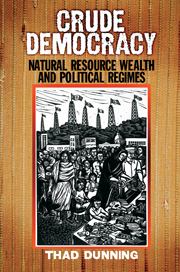Book contents
- Frontmatter
- Contents
- List of Figures
- List of Tables
- Preface and Acknowledgments
- Crude Democracy: Natural Resource Wealth and Political Regimes Cambridge
- 1 DOES OIL PROMOTE DEMOCRACY?
- 2 THE FOUNDATIONS OF RENTIER STATES
- 3 RESOURCE RENTS AND THE POLITICAL REGIME
- 4 STATISTICAL TESTS ON RENTS AND THE REGIME
- 5 THE DEMOCRATIC EFFECT OF RENTS
- 6 RENTIER DEMOCRACY IN COMPARATIVE PERSPECTIVE
- 7 THEORETICAL EXTENSIONS
- 8 CONCLUSION: WHITHER THE RESOURCE CURSE?
- Appendix: Construction of the Simulations
- Bibliography
- Index
Preface and Acknowledgments
Published online by Cambridge University Press: 17 July 2009
- Frontmatter
- Contents
- List of Figures
- List of Tables
- Preface and Acknowledgments
- Crude Democracy: Natural Resource Wealth and Political Regimes Cambridge
- 1 DOES OIL PROMOTE DEMOCRACY?
- 2 THE FOUNDATIONS OF RENTIER STATES
- 3 RESOURCE RENTS AND THE POLITICAL REGIME
- 4 STATISTICAL TESTS ON RENTS AND THE REGIME
- 5 THE DEMOCRATIC EFFECT OF RENTS
- 6 RENTIER DEMOCRACY IN COMPARATIVE PERSPECTIVE
- 7 THEORETICAL EXTENSIONS
- 8 CONCLUSION: WHITHER THE RESOURCE CURSE?
- Appendix: Construction of the Simulations
- Bibliography
- Index
Summary
As this book goes to press, we are living in the midst of a petroleum boom akin to the two oil shocks of the 1970s. The per-barrel price of crude surpassed $100 in the first days of 2008, nearing in real terms the price records set during previous booms. For consumers in oil-importing countries, the rising price of petroleum represents an unwelcome cost and a source of inflationary pressure at a time of slowing economic growth. As in the earlier oil shocks, however, the sharply rising petroleum price implies an economic bonanza of epic proportions for oil-exporting countries. How will the boom affect economic and political institutions in those countries?
To analysts of the 1970s, a sustained petroleum boom could only boost the fortunes of oil-rich countries. Social-scientific theories suggested that rising national income would be good for democracy too. Yet, by the 1990s, scholars had begun to question the economic and political benefits of the first two oil shocks. Jeffrey Sachs and Andrew Warner, among others, presented research showing that the resource-rich countries had grown less, not more, than similar resource-poor countries (Sachs and Warner 1995); in another influential early discussion, Terry Karl asked why, “after benefiting from the largest transfer of wealth ever to occur without war … have most oil-exporting developing countries suffered from economic deterioration and political decay?” (Karl 1997: xv).
- Type
- Chapter
- Information
- Crude DemocracyNatural Resource Wealth and Political Regimes, pp. xv - xxPublisher: Cambridge University PressPrint publication year: 2008



